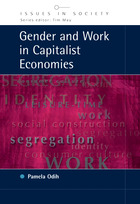| About the book |
From the industrial revolution through to more recent advances in information technology, radical changes in working practices have accelerated rates of production to previously unimaginable levels. The establishment of wage relations, in the second half of the 19th Century, precipitated the rise of the 'employment society' and a movement towards synchronized work. Industrialization epitomized the capitalist definition of work time. In Gender and Work in Capitalist Economies, Pamela Odih advances a politics of gender and time, exploring the sociological aspects of work. This book provides a dynamic intervention into Marxist analysis of time and capitalist accumulation, and looks at how in contemporary regimes this translates as the universal appropriation of women?s labour time. Pamela Odih reasons that it is a disconcerting fact of global manufacturing, that accelerated turnover gains have become increasingly dependent on the exploitation of a spatially disaggregated, feminized global assembly-line. The book explores:
|
| About the authors |
| Table of contents |
Introduction: Gender, capitalist accumulation and the political economy of time Part One - Industrial times Primitive accumulation and gendered histories of dispossession Weaving time; gender and the rise of the British textile industry in the 19th century Economies of time and gender in industrial capitalism Part Two ? Fordist times Gender and identity in modern times Timely reminders of gender and modern work Part Three - Post-Fordist Times Post-Fordist production and the time disciplined call centre (with David Knights) Gender work and organisation in the time/space economy of `just-in-time? labour Part Three - Global times Women, work and inequality in the global assembly-line Conclusion: Towards a politics of gender, work and time |


